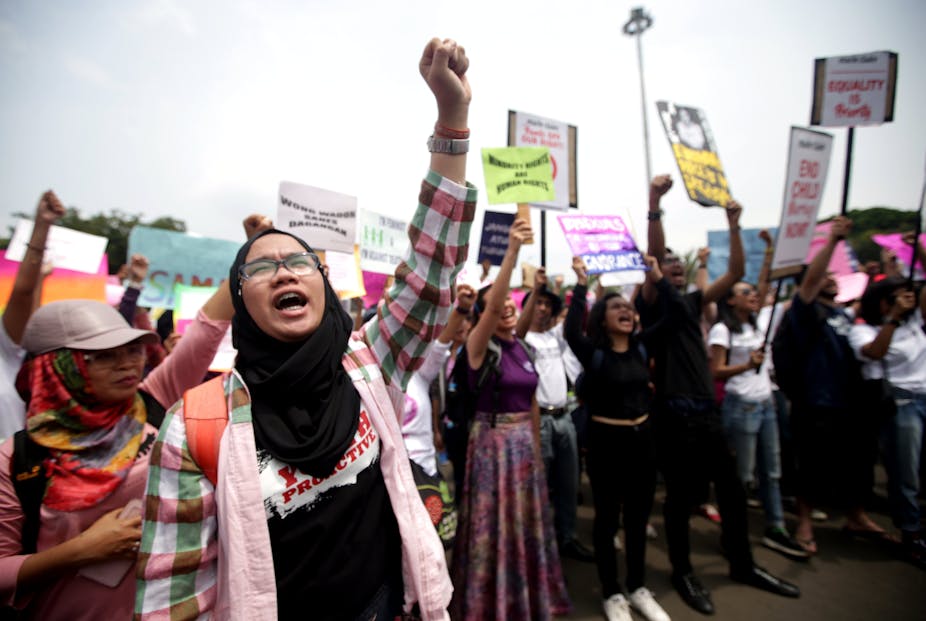In 2016, 14-year-old Yuyun was walking home from her school in Bengkulu. When she didn’t arrive, her mother began searching. Two days later, Yuyun’s body was found, battered, bruised, with her hands tied behind her back. Fourteen men allegedly are responsible for her rape and murder.
If any good comes from such a heinous crime, it will be a law penalising sexual violence against women to protect women from sexual assaults and provide a more comprehensive legal basis for how to treat sexual violence victims.
Such a law was soon mooted in the form of an anti-sexual violence bill. Yet, three years on, the bill languishes.
For what reason could lawmakers in Indonesia oppose a bill protecting their own daughters, mothers, sisters and cousins from rape and murder? To understand such reasons, we need to look into what I call Indonesia’s populist morality movement.
What is the populist morality movement?
Indonesia’s populist morality movement is characterised by support among everyday Indonesians, and especially those with political and religious power, for the elimination, at any price, of certain behaviours.
These include blasphemy in its broadest sense, drinking alcohol, taking drugs, having consensual sex outside of marriage, or even being found in a place suggestive of sex (like a sauna or a nightclub).
These are moral issues because their rightness or wrongness is in the eye of the beholder.
It is a populist movement because these ideas are driven by politicians and religious leaders who want to win power by appealing to ordinary people who feel their concerns have been disregarded.
Where did this movement come from?
In the early 2000s, following Indonesia’s 1998 move to democracy, a raft of socially progressive moves were ratified.
There were new laws protecting basic human rights, women’s rights, sexual rights and ethnic rights.
For instance, in 2004, it became a punishable offence for a husband to rape his wife. While the burden of proof is such that even a woman brave enough to report the crime is unlikely to be vindicated, it was a good first step.
Two decades later, there is a backlash against these progressive moves. Rather than supporting vulnerable people and protecting them from sexual violence, the state is now moving closer to not only condoning sexual violence but advocating it. This can be seen from efforts to propose a law against all sexual relations outside marriage.
Why the backlash against basic human rights?
I suggest the backlash has come about for one clear reason.
Indonesia enabled freedom of speech without sufficient controls on hate speech. Conservatives have taken advantage of this space to espouse hatred for other communities like LGBT people.
In particular, Islamists, who were largely kept in check during former president Suharto’s authoritarian reign, have seized the opportunity to gain power.
The fact that women were banned from wearing the veil under Suharto and now are often forced to wear it shows the vicissitudes of power and the reframing of what is considered to be moral.
What impact is this having on sexual violence?
The rhetoric of politicians and religious leaders denouncing supposedly immoral behaviour has meant people now oppose a bill that aims to eliminate sexual violence. How can this be? How can people who purport to be moral oppose the bill?
Opposition to the bill stems from odd places. One opponent, for instance, is Euis Sunarti, a Bogor Agricultural Institute professor who, along with the Family Love Alliance (AILA), previously petitioned the Constitutional Court to criminalise homosexual relationships.
Euis argues that sexual violence should be penalised, but her problem with the bill is that it penalises only non-consensual sex. She thinks the bill should penalise all sex outside of marriage.
The populist morality movement has been so powerful that now in 2019 to talk about eliminating sexual violence against women is interpreted by many to mean supporting women’s right to have sex outside of marriage.
People like Euis preposterously argue that a bill against sexual violence will encourage adultery and inspire people to become LGBT.
Prominent human right rights activist Andreas Harsono gave a talk in Auckland, New Zealand, in August 2019. He argued that more human rights abuses are happening now in Indonesia than during Suharto’s time. One audience member challenged him on this, arguing that human rights are better now.
On reflecting on this exchange, I would offer a different conclusion. People continue to suffer in Indonesia, but those suffering most have changed.
Under Suharto, you did not want to be Chinese, Confucian, Communist, a strict Muslim, or from East Timor or Aceh. But now you don’t want to be LGBT or indeed have sex outside marriage.
If Indonesian lawmakers care at all about women, if they care at all about the legacy they will leave their daughters and granddaughters, they will pass this bill and show that violence against women in any form is not OK.
There is nothing to deliberate, nothing to debate. Sexual violence is wrong. Pass the bill.


